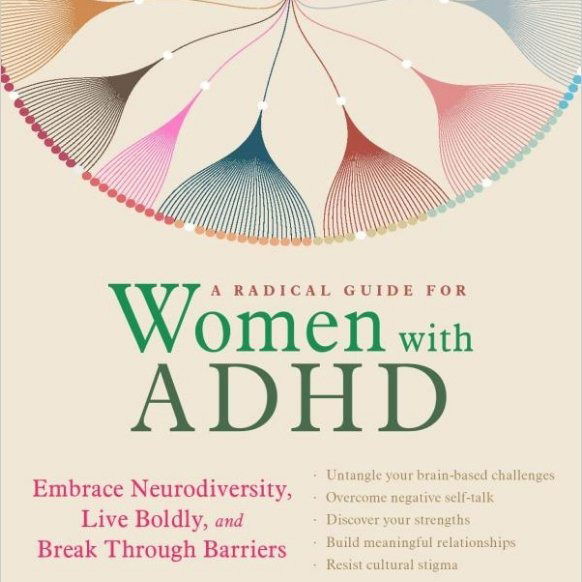“Brain Shame”: The New Body Shame

by Sari Solden
If you are a woman with the organizational struggles of ADHD, you may relate to the shame that women in our culture feel when they are unable to conform to the gender expectations you have internalized and idealized. In our new book, A Radical Guide for Women with ADHD, my co-author—Michelle Frank, Psy.D.—and I created the term “Brain Shame,” to describe the way women with brain-based differences feel when compared to the idealization of neurotypicality. Just as women feel deep wounds when they feel they don’t live up to the standard of culturally approved bodies, so, too, do women with ADHD feel hurt when they can’t conform to expectations about how to be “good enough” in other ways that highlight their brain-based challenges.
In my thirty years of counseling women with these challenges, I have focused on this pattern and have consistently found—just as with body shame—women with organizational, memory, and attention difficulties idealize other women’s ability to multitask, organize, activate, and filter out distractions. Instead of fantasizing about fitting into a size three, these women dream about fitting into a different, deeply internalized gender expectation by which they measure and define their self- worth.
These women yearn to live clutter-free, rid of the omnipresent piles surrounding and haunting them. These chronically disorganized women yearn for the day when they can calmly respond to an unexpected person at their door or an innocent request from a friend for an unscheduled ride in their car without the panic that their disarray will be revealed.
All the mundane tasks of daily living—shopping, cooking, dressing, laundry, remembering bedtime and morning routines—elude them, just as it does with ADHD men. But women tend to grow increasingly insistent on delaying their pursuit of meaningful work, nourishing relationships, or creative passions until they achieve organizational perfection, their brain function’s size three.
One client summed it up perfectly when she implored, “Please help me get over this case of terminal uniqueness!”
I have never had a woman with these challenges come to an initial consultation seeking self-acceptance or a meaningful life. Instead, their desire is simple. In the same way that a woman who has body shame is convinced that her life won’t begin until she achieves her idealized body image, a woman with organizational and attention difficulties is often intent on being “fixed” so that she can achieve organizational nirvana. Her firmly held belief is that self-worth depends on this. Acceptance is a word that is anathema to her. If anything it signifies even more failure. She doubles down on her planners and tips, tools, and strategies; she hides away and digs more deeply into her piles, but often ends up burying her authentic self under them.
Women with ADHD are often not identified early on in life because girls do not typically have the hyperactivity associated with boys who are diagnosed. In fact, they are often people-pleasers who internalize their struggles instead of acting out. Because they have often grown up without an explanation for their challenges, their sense of self often becomes “tangled up” with their brain-based challenges, leading to their conclusion that their difficulties must be reflective of a deep character flaw. In our book, Dr. Frank and I describe the process we call ‘untangling,” through which we are able to help women escape this insidious web of hiding and shame.
These neurodiverse women, just like those with body shame—or a member of any minority group, really—often internalize culturally transmitted gold standards of what is “good” and then toxically compare themselves to these false goals and illusory images.
Below are helpful steps you can take to take to address your brain shame and begin to take back ownership of your life:
Become aware of how frequently you compare yourself to women who are organized and notice the cultural messages you constantly absorb from the media and from those around you. Listen through the lens of a minority and observe how neurodiverse women are talked about in a devalued way. Tune into your self-talk at these times and notice how this perpetuates your shame and redoubles your attempts to hide.
Begin to look around for new role models of women. These don’t have to be women you know; they may be well-known, or in literature or movies. For example, I saw a documentary on the life of Supreme Court Justice Ruth Bader Ginsberg where I discovered her family wouldn’t let her near the kitchen because she was so clueless in this role. Obviously, her lack of ability didn’t define her! Contemplate what would have happened if she had made herself wait until she was better at cooking before she let herself go to law school or become a judge.
Learn to talk to yourself in “whole person” language. For example, instead of solely focusing on your challenges, you might enlarge your view to be able to say for example, “I have problems with organization and I am smart and funny and warm and artistic.”
Take the smallest tolerable step out of your comfort zone toward a new experience of success that reflects this view of yourself as a whole person. Take one step toward something you have always loved to do or wanted to try, even though you aren’t organized. Take a yoga class, take a walk, read a book, begin to write the first page of your novel, call a friend, volunteer for a meaningful cause. Choose something that reflects who you are beyond your piles and clutter. Positive psychology tells us to build what’s strong, not just try to eliminate and focus all our efforts on what’s wrong.
Begin the practice of tolerating your disorganization, walking alongside your challenges instead of fearing them or letting them engulf you. Find a professional to support you, someone who is centered on you as a whole person and not only focused on your outward symptoms as a measure of your success. Just as with body shame, you wouldn’t want help from someone who was only interested in how much weight you lost that week, but instead focused on the quality of your health and life.
Yes, brain shame is a lot like body shame.
Let go of your rigid diets of organizational systems and instead practice accepting your unique brain, getting support for your challenges, and focusing on your enduring core qualities so that you can move toward a compelling new vision for your life.
And above all remember, as Dr. Frank and I like to say, “Only dogs and furniture need fixing!”
